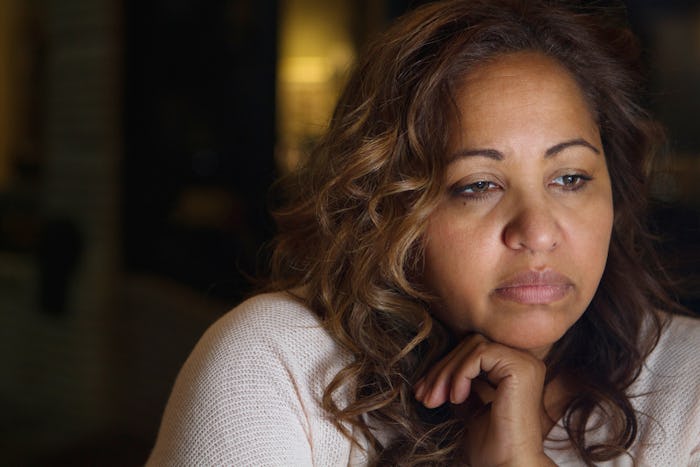Life
Two days after I came home from the hospital with my newborn daughter, I found myself sobbing in bed and cradling her to my chest. I couldn’t explain to anyone why I was so upset or what was happening. There was only one word that can convey what I was feeling — sadness. I would feel fine in the mornings, but as the day wore on, I became paralyzed with a darkness. I was concerned and couldn’t figure out what was wrong. I was worried that this was one of the many signs of postpartum depression.
It turns out my experience was nothing more than a case of the post-baby blues, which the American Pregnancy Association notes is a feeling of sadness that occurs in 80 percent of mothers soon after their child is born. I was lucky, as the baby blues only last for around ten days. But, according to Postpartum Progress, 10 to 15 percent of new moms suffer from postpartum depression, or PPD, an extended period of sadness that causes some women to think they aren’t capable of caring for their child.
It’s incredibly important that you talk about your feelings and speak to your doctor, regardless if you think it’s baby blues or PPD. To better understand symptoms of PPD and what can cause them, I spoke with Katherine Stone, founder and director of Postpartum Progress, a nonprofit organization that raises awareness about PPD while offering a safe place for women to find support. “When you recognize you are not yourself and that you aren't able to function on a daily basis as you would like, that’s a sign,” Stone says. But as she also notes that “what PPD looks like for one mom is not what it necessarily looks like for another” so it’s important not to stick to list of symptoms when it comes to helping yourself or another new mom. That being said, there are some symptoms of PPD that are fairly common. Here are just a few signs that you or another woman has more than a touch ouch of the baby blues.
1
You Fear Something Will Happen To Your Baby
Your baby was safe and protected for those nine months they were in your womb. But once they’re out in the world, Stone says many women “have a lot of anxiety symptoms” related to the safety of their child. Some of the worries are natural, but more the more intense and irrational fears may be a result of the hormonal shift. “Estrogen and progesterone levels increase 10- to 100-fold during pregnancy, then fall to essentially zero within 24 hours of delivery," Elizabeth Fitelson, director of the Women's Program at the Columbia University Department of Psychiatry told Parents magazine. Combine the shift with the sleep deprivation and additional responsibilities, and your mind may not be able to think rationally.
2
You Suffer From Insomnia
You knew that being a new mother would mean running low on sleep, but if you find yourself incapable of drifting off once the baby’s down, you should contact your doctor. As Postpartum Progress notes, your sleep can be disturbed by a major emotional event, like having a baby, but if you’re experiencing anxiety as well, it can inhibit your winding down for bed.
3
You Feel Guilty
Postpartum depression can make you feel incredibly guilty. You may find yourself questioning your parenting choices, feeling guilty for crying all of the time, or guilt about the type of mother you are, according to Psychology Today.
4
You Think About Harming Yourself Or Your Baby
Whether you want to end your own misery or are terrified that your baby isn’t going to have the life you intended for them, this symptom is not to be ignored. Postpartum Progress notes that this can evolve into another serious condition like postpartum OCD, and you should call your doctor immediately.
5
You Feel Angry All The Time
It’s called “postpartum rage” for a reason. “One woman might say the things that really stuck out to her about PPD were the symptoms of irritability, anger and even rage,” Stone says. She further explains like you constantly feel like Hulking out on those around you, and can’t seem to control it. Your partner forgets to close the wipes lid, and you find yourself throwing a breast pump at them. It can be terrifying, but with the right treatment it’s curable.
6
You Withdraw From Family And Friends
Everyday Health notes that withdrawing socially is one of the biggest signs of depression. The same is true for PPD. “You might feel very withdrawn, numb, and want to isolate yourself socially,” Stone says. “You have little to no interest in being around your family or friends, a feeling you might blame on being exhausted or your lack of emotional control.”
7
You Feel Disconnected From Your Baby
One of the most heartbreaking signs of PPD is a doozy. If you find yourself feeling disconnected from your baby or uninterested in taking care of them, your postpartum depression can be blamed. “Sometimes it takes a while to recognize that because motherhood is such a huge transition anyway,” Stone says. Many women try to attach themselves more to their children when they realize they feel disconnected, but they can find this exhausting, and it makes them retreat even more. Stone promises that this doesn’t have to last forever. “If you know in your heart that you really don't recognize yourself right now, and that you are having some of the symptoms we've talked about for longer than a couple of weeks, it's worth reaching out to someone.”
